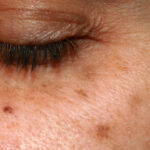By: Alison Weinlaeder
We’ve all had this experience in conversation: You are in the middle of a story and you suddenly cannot say the name of the person, place, or thing you want to talk about. “You know…the thing… what’s it called…you know, the thing…” Seconds pass like hours as you search for the word you know you know. The inability to say a word when you want to say it is referred to as word-finding difficulty or tip-of-the-tongue (TOT) experiences by those who study language and the brain. These episodes can be frustrating or even embarrassing and unfortunately may become more frequent with age.
Why Does This Happen?
While research indicates that older adults usually have much larger vocabularies than younger adults (1), normal age-related neural changes can slow down how quickly older adults are able to access and speak the sounds for a word they want to say (2), known as phonological retrieval.
What To Do About It?
 The good news is that you don’t have sit by and let language changes compromise your comfort with conversation. In fact, you should do the exact opposite of sitting: Get Moving! A study from the University of Birmingham in 2018 found that adults who got regular aerobic exercise had less frequent tip-of-the-tongue episodes than similarly aged adults with poorer aerobic health. Many studies have demonstrated the positive impact of exercise in reducing the risk of cognitive changes (e.g. memory loss) with age, and now we know that exercise is also beneficial for keeping language strong, too.
The good news is that you don’t have sit by and let language changes compromise your comfort with conversation. In fact, you should do the exact opposite of sitting: Get Moving! A study from the University of Birmingham in 2018 found that adults who got regular aerobic exercise had less frequent tip-of-the-tongue episodes than similarly aged adults with poorer aerobic health. Many studies have demonstrated the positive impact of exercise in reducing the risk of cognitive changes (e.g. memory loss) with age, and now we know that exercise is also beneficial for keeping language strong, too.
The other strategy for maintaining your language abilities with age is to “use it or lose it.” This is a favorite phrase of speech-language pathologists when working with adults who have word-finding difficulty. By this we mean, if you want to improve language access, you’ve got to talk, talk, and talk some more. Pick up the phone or schedule a Facetime chat with a friend. Stretching conversation beyond everyday topics like weather and pleasantries will also help you flex the brain’s language center.
A New Tool for Exercise and Word-Finding
Cardiomelon is a new online fitness subscription program with a twist: it pairs language, memory, and attention tasks with cardiovascular workouts to fight the effects of aging on both the mind and body. It is designed specifically for adults over 50 and with videos just 20-30 minutes long, it is easy to fit into your day. Experienced trainers lead exercises with plenty of modifications for users who have mobility issues. While you move your body, you’ll be prompted to name items in a specific category, state opposites, or recall novel word lists, to give a few examples. Membership starts at just $10 month, less than many gym fees. If you are looking for a new way to improve your cardiovascular health while challenging your language and cognitive skills, give Cardiomelon a try at www.cardiomelon.com.
Alison Weinlaeder is a speech-language pathologist from St. Paul, Minn. She is the founder of Cardiomelon.
References:
- Brysbaert, M., Stevens, M., Mandera, P. & Keuleers, E. (2016) How Many Words Do We Know? Practical Estimates of Vocabulary Size Dependent on Word Definition, the Degree of Language Input and the Participant’s Age. Frontiers in Psychology7, 10.3389/fpsyg.2016.01116.
- Shafto, M. A., Burke, D. M., Stamatakis, E. A., Tam, P. P., and Tyler, L. K. (2007). On the tip-of-the-tongue: Neural correlates of increased word-finding failures in normal aging. Cogn. Neurosci.19, 2060–2070. doi: 10.1162/jocn.2007.19.12.2060
- Segaert, K., Lucas, S.J.E., Burley, C.V. et al.(2018) Higher physical fitness levels are associated with less language decline in healthy ageing. Sci Rep 8, https://doi.org/10.1038/s41598-018-24972-1










